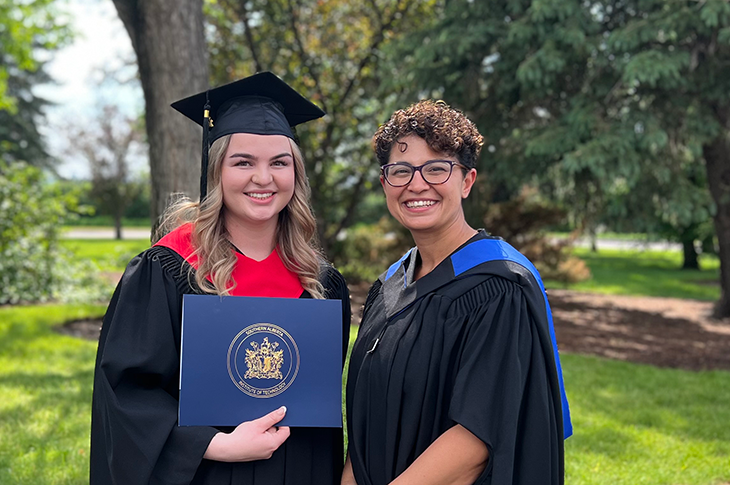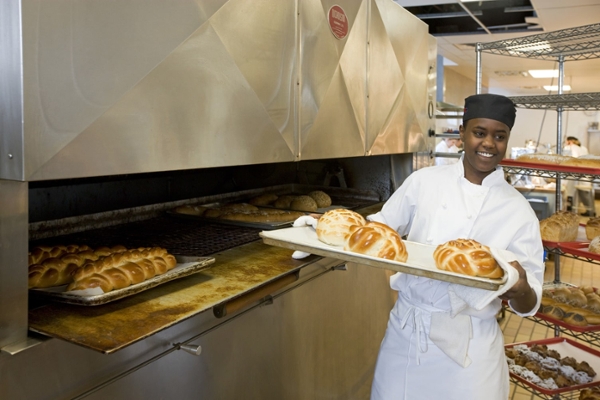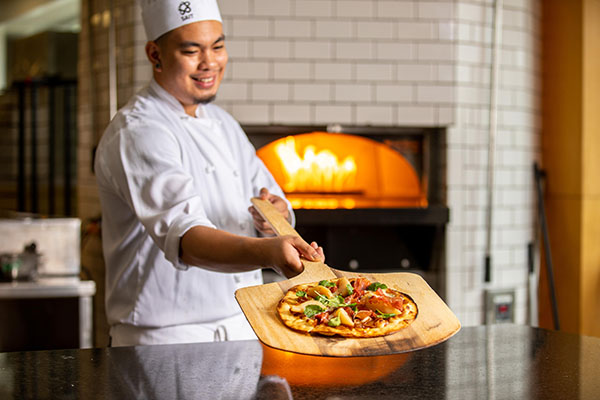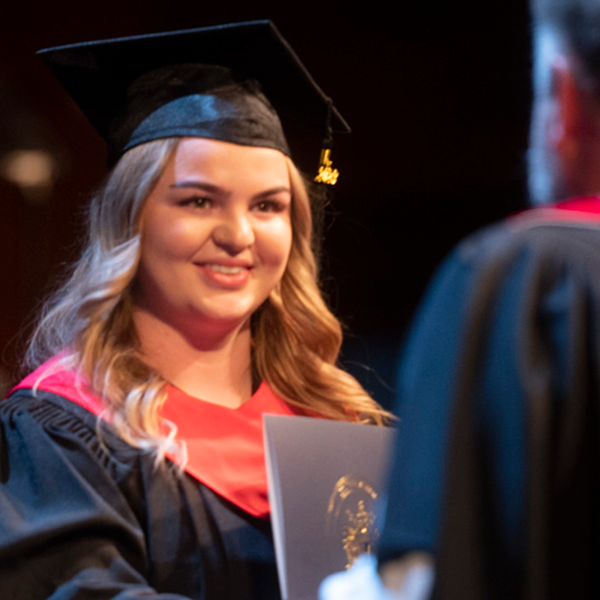SAIT teaches the skills to deliver on a guest service mindset in hospitality
Students level up their interpersonal skills to bring best-in-class service to future guests.

Like the carefully considered suitcase, packed with the perfect balance of outfits for the trip and space for souvenirs to bring home, a combination of technical skills and essential skills are critical components to an education in Hospitality and Tourism Management. Graduates with a versatile skillset are valued in an industry where creating a consistently strong guest experience requires individual adaptability, strong teamwork and wide-ranging hospitality expertise.
"During the program redesign process in 2019, our focus extended beyond technical skills,” says Hala Dehais, Associate Dean, School of Hospitality and Tourism. “We heard resounding feedback from over 70 industry partners, emphasizing the importance of essential skill development to the success of our students after graduation. We crafted a comprehensive curriculum that balances both the technical and interpersonal aspects of the hospitality and tourism industry, centered on a strong guest service mindset."
Applied learning is the foundation of SAIT programs, and essential skill development complements the more traditional elements of a hospitality education — like sales, event management, hotel operations and marketing strategy. The School of Hospitality and Tourism moved up three spots in CEOWORLD Magazine’s 2023 Best Hospitality and Hotel Management Schools in the World to rank #15 in the world and once again is the only school in Canada to earn a spot on the list. The living classrooms where students learn to apply leadership, team management and cultural awareness are a significant part of the school’s continued success.
Students take several courses like Self Awareness and Team Dynamics, Leading High-Performance Teams, and Leadership and Organizational Culture throughout their program that focus on essential skills. “The courses engage students in the conversation,” says Danielle Radke, instructor for Hospitality and Tourism Management. “Students start by looking at themselves — what have they been through, what have they experienced? Then we expand our focus to the team and ultimately the organization.” Similar courses have since been added to both the Baking and Pastry Arts and Culinary Arts programs.
Finding a guest service mindset
View this post on Instagram
Excellence in customer service means a consistent delivery of exceptional experiences, which is easier said than done. A guest service mindset requires empathy, anticipating customer needs and adaptability among other qualities. Discovering individual strengths and areas to improve is a good foundation for best-in-class service.
For students in their first semester, Dehais explains their journey starts with self-discovery. “Self-awareness is understanding what's important to you and where your values come from, then you can explore how that impacts the way you interact with others. Every day, our grads are serving a special dinner, planning a fantastic vacation, creating a once-in-a-lifetime event — someone’s special moment — self-awareness translates to the confidence needed to deliver on memorable moments.”
Brielle Savage, who graduated from the Hospitality and Tourism Management program this June, started her journey at SAIT with a passion for travel. She’s since expanded her interest in the industry and finds opportunities to elevate her approach each day in small ways. "We all have questions about the menu, and a server who can make recommendations is so reassuring. The next step for guest experience is reading the situation and adjusting accordingly — an intimate date needs a different approach than a bachelor party. Empathizing with your guests and adjusting your service personalizes the experience and makes guests feel cared for, comfortable and appreciated.”
Making the connection between understanding the guest’s perspective and then recalibrating as needed happens first in the classroom as students work through scenarios in teams to build on new skills.
“Service isn’t standardized when we're dealing with people, so building our students’ confidence strengthens their ability to negotiate through a wide variety of situations,” says Radke. “Once they realize they know what to do in our simulated environments, they're more comfortable applying those skills in the real world.”
Our compliments to the team
View this post on Instagram
When you walk into a hotel lobby and feel that warm, welcome atmosphere, you know it, though it can be hard to put a finger on exactly what sets those experiences apart. How do intangible qualities make their way from the classroom to a hotel in your next travel destination? For Savage, it’s thanks to a team of trained staff who all contribute to the culture and shared vision, and know how to achieve that together, who make a strong guest experience. “The overall meaning of hospitality is the feeling of being welcome and accepted. Strong team dynamics, along with self-awareness, contribute to that feeling for guests. Everyone can excel in their strengths and work together to create an environment and culture in which guests can have the greatest overall experience.”
In the course Leading High-Performance Teams students discuss what elements are part of an A-team in great destinations — a combination of culture, environment and individual contribution — and then they put those skills to the test in that course and the applied labs in the third semester. “We’ve seen the communication in pre-shift meetings, which happen before the Highwood restaurant opens, get so much stronger,” says Dehais. “The practice gained in our applied labs is also impacting how they're working as team players or team leaders when they go out into industry.”
Self-care skills for success
View this post on Instagram
Delivering a high level of service consistently means students need to learn how to create a professional space for themselves and their teammates. “Our instructors highlighted the importance of self-care in the hospitality industry, as it can be a tough and tiring industry,” says Savage. “To create memorable experiences for others, you need to take care of yourself first and never be afraid to ask for help.”
As everyone rediscovers or finds for their first time, a love of travel, the hospitality industry will only get busier notes Radke, and hospitality teams need to have a well-rounded set of skills. “We show students how to be self-sufficient, set respectful boundaries, increase their resilience and access support. As we have more conversations about how everyone is doing during our classes, those skills become innate. We also cover conflict negotiation — how do I manage a difficult situation with a guest who wants something very particular — so our grads know how to manage a wide range of situations.”
Dehais emphasizes that these skills are highly transferable to other industries. “Companies across the globe recruit hospitality and tourism graduates for their customer service manager roles for this very reason — that guest-centric mindset and the skills to deliver on it.”
Start your journey with self-discovery and gain hands-on skills for your career in hospitality in one of these in-demand programs.

Baking and Pastry Arts
-
Diploma
- Program Length: 2 years
- Campus: In person (Main Campus)
- Faculty: School of Hospitality and Tourism

Culinary Arts
-
Diploma
- Program Length: 2 years
- Campus: In person (Main Campus)
- Faculty: School of Hospitality and Tourism

Hospitality and Tourism Management - Multi-Disciplinary
-
Diploma
- Program Length: 2 years
- Campus: In person (Main Campus)
- Faculty: School of Hospitality and Tourism
Skills for the Future
We prepare students for successful careers and lives.
SAIT'S
2020-2025
Strategic plan

Oki, Âba wathtech, Danit'ada, Tawnshi, Hello.
SAIT is located on the traditional territories of the Niitsitapi (Blackfoot) and the people of Treaty 7 which includes the Siksika, the Piikani, the Kainai, the Tsuut’ina and the Îyârhe Nakoda of Bearspaw, Chiniki and Goodstoney.
We are situated in an area the Blackfoot tribes traditionally called Moh’kinsstis, where the Bow River meets the Elbow River. We now call it the city of Calgary, which is also home to the Métis Nation of Alberta.
